Find Help
More Items From Ergsy search
-

Redundancy Crusader and Annabel Kaye on communications in redundancy (5).MTS
Relevance: 100%
-

Redundancy Coaching Couch 4:Redundancy and Language
Relevance: 74%
-

Redundancy Coaching Couch 5: Redundancy and Feedback.MTS
Relevance: 74%
-

Redundancy Coaching Couch 1: Redundancy and Presuppositions
Relevance: 72%
-

Redundancy Coaching Couch 7: Redundancy and Judgement.MTS
Relevance: 69%
-

Redundancy Crusader and Annabel Kaye on making redundancy a better experience (2).MTS
Relevance: 68%
-

What is a fair selection process for redundancy?
Relevance: 68%
-

Redundancy Crusader and Annabel Kaye on scope and scale of redundancy (3).MTS
Relevance: 68%
-

Redundancy Coaching Couch 2: Redundancy and Passion
Relevance: 67%
-

How should companies consult employees about redundancy?
Relevance: 67%
-

What are the legal requirements for redundancy in the UK?
Relevance: 67%
-

What is the primary purpose of redundancy?
Relevance: 67%
-

How should employers manage the emotional impact of redundancy on employees?
Relevance: 66%
-

Redundancy Crusader and Annabel Kaye on the Current Model of Redundancy (1).MTS
Relevance: 66%
-

What is the primary purpose of redundancy?
Relevance: 65%
-

Can an employee appeal a redundancy decision?
Relevance: 64%
-
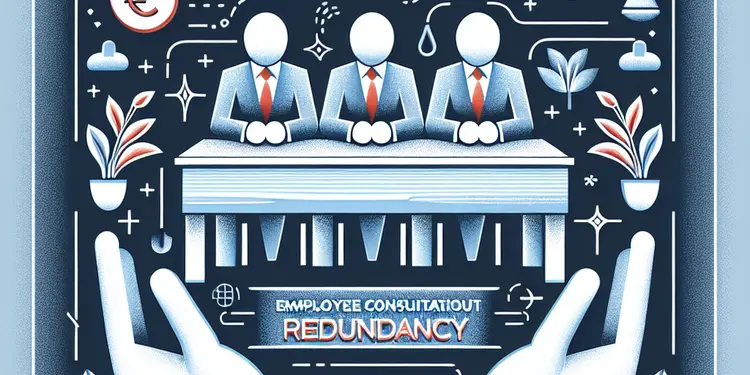
How should companies consult employees about redundancy?
Relevance: 64%
-

What is the role of trade unions in the redundancy process?
Relevance: 62%
-

What are the legal requirements for redundancy in the UK?
Relevance: 62%
-

How is redundancy pay calculated in the UK?
Relevance: 62%
-
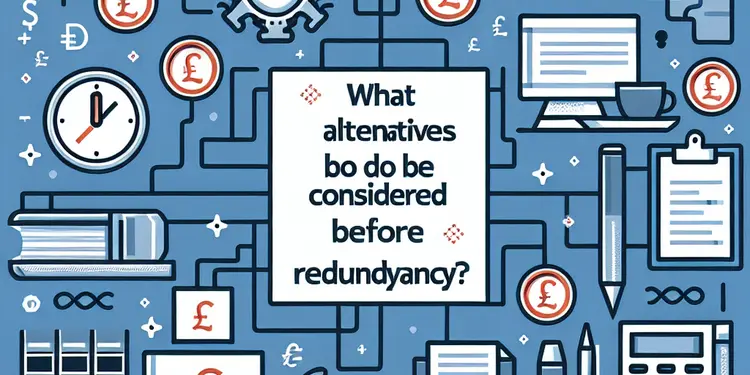
What alternatives should be considered before redundancy?
Relevance: 62%
-

Redundancy Coaching Couch 3: States
Relevance: 61%
-

Are there any protections for employees on maternity leave during redundancy?
Relevance: 61%
-
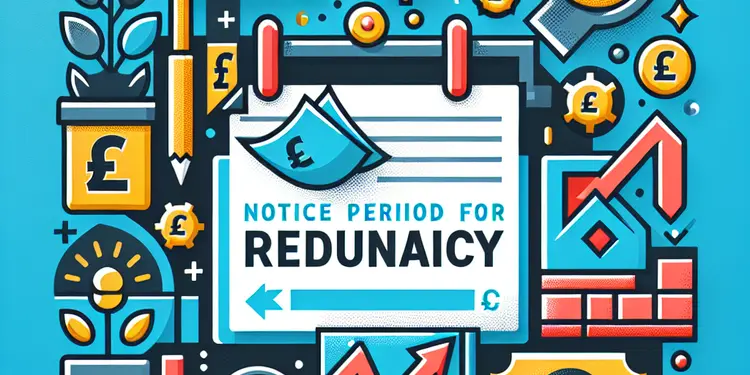
What is the notice period for redundancy?
Relevance: 61%
-

What support can employees expect during redundancy?
Relevance: 61%
-

Frequently asked questions about redundancy from ACAS
Relevance: 60%
-

What is redundancy pay and who is eligible for it?
Relevance: 60%
-

What is redundancy pay and who is eligible for it?
Relevance: 60%
-
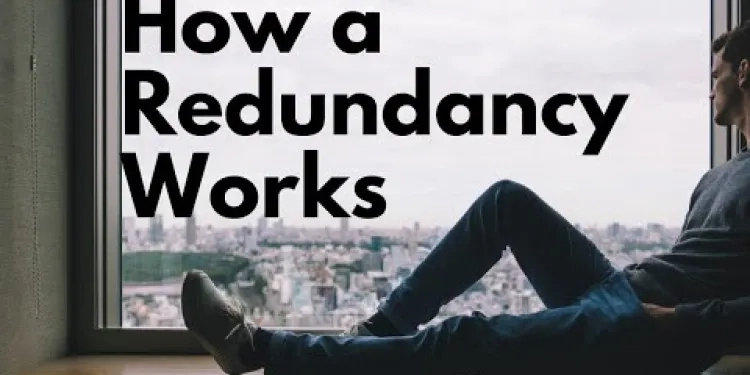
HOW A REDUNDANCY WORKS - General Information
Relevance: 60%
-
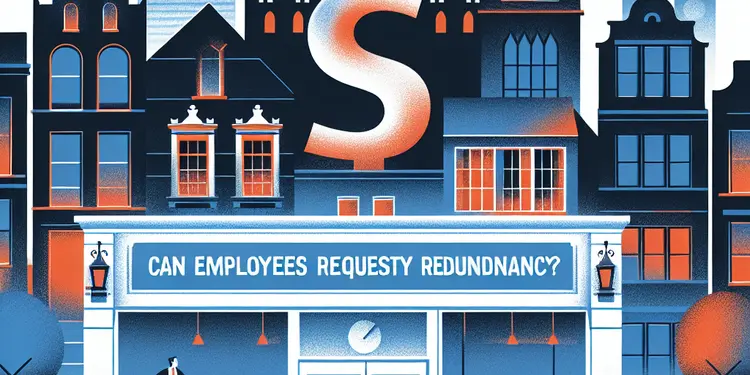
Can employees request voluntary redundancy?
Relevance: 60%
-

What happens if an employer does not follow the redundancy process?
Relevance: 56%
-

How does autism affect communication?
Relevance: 48%
-

How important is communication in primary care support?
Relevance: 46%
-

Is there a specific organization for complaints about unsolicited communications?
Relevance: 44%
-

How are hosepipe ban restrictions communicated to the public?
Relevance: 42%
-

Is there a specific organization for complaints about unsolicited communications?
Relevance: 30%
-

Understanding Your Rights: Legal Support for Families During Economic Turbulence
Relevance: 21%
-

How to help deaf and hearing impaired patients and staff through Covid
Relevance: 14%
-

How can primary care support workers contribute to patient care improvement?
Relevance: 13%
-

Will HMRC contact me via phone or email regarding my tax refund?
Relevance: 13%
The importance of communications in the redundancy process for employers
Effective communication is crucial during the redundancy process for several reasons:
- Clarity and Transparency:
- Clear communication ensures that employees understand the reasons behind the redundancy, the selection criteria, and the overall process. Transparency builds trust and helps alleviate uncertainty.
- Emotional Impact:
- Redundancy is often an emotionally charged experience. Open communication allows employers to empathize with affected employees, providing support and resources to help them cope with the changes.
- Legal Compliance:
- Effective communication is essential to comply with legal requirements surrounding redundancy. Employers must communicate key details such as notice periods, severance packages, and rights, ensuring legal obligations are met.
- Maintaining Morale:
- Transparent communication can help maintain morale within the remaining workforce. Addressing concerns and providing context can prevent rumors and mitigate the negative impact on employee morale and motivation.
- Retaining Talent:
- Clear communication about the company's future plans, restructuring, or potential opportunities for reassignment can encourage talented employees to remain with the organization during challenging times.
- Employee Engagement:
- Engaging in open communication allows employees to express their concerns and ask questions. This involvement can foster a sense of inclusion and show that the organization values its employees' perspectives.
- Mitigating Legal Risks:
- Poor communication during the redundancy process can increase the risk of legal disputes. Clearly conveying information, consulting with employees, and following proper procedures can mitigate these risks.
- Reputation Management:
- Effective communication protects the company's reputation. How an organization handles redundancy, including communication with affected employees and external stakeholders, can influence public perception.
- Support Services:
- Communication is essential when providing information about support services available to affected employees, such as outplacement services, counseling, and assistance in finding new employment.
- Preventing Misinformation:
- Clear communication helps prevent the spread of misinformation. By providing accurate information, employers can ensure that employees have a clear understanding of the situation and its implications.
In summary, communication is vital during the redundancy process to address legal requirements, maintain employee morale, and navigate the emotional impact of such significant changes in a transparent and compassionate manner.
Redundancy Crusader and Annabel Kaye on Communications in Redundancy
Understanding Redundancy Crusader
Redundancy Crusader is a platform dedicated to supporting those facing redundancy in the United Kingdom. It provides a wealth of resources and practical advice on navigating the complex process of redundancy, from understanding legal rights to finding new employment. The platform aims to demystify redundancy, empowering individuals with the knowledge and confidence to face their career transitions head-on.
Role of Annabel Kaye
Annabel Kaye is a noted employment law specialist and founder of Irenicon, a consultancy firm that specializes in employment relations. With decades of experience, Annabel has become a trusted voice in the realm of employment law, particularly focusing on redundancy and workplace conflict resolution. Her insights and expertise offer crucial guidance to both employers and employees during the difficult redundancy process.
Effective Communication during Redundancy
Communication is key during redundancy, both for the employees facing job loss and the employers managing the transition. Clear and consistent communication helps to alleviate uncertainty and build trust. Annabel Kaye emphasizes that employers should communicate openly about the reasons for redundancy, the processes involved, and the support available to employees. This transparency helps to minimise potential misunderstandings and fosters a more collaborative atmosphere.
Strategies for Employers
Employers should plan their communication strategy carefully. Annabel suggests holding regular meetings where employees can ask questions and express concerns. Written communications, such as emails and official notices, should be clear and devoid of technical jargon. Providing detailed information about timelines, severance packages, and outplacement services ensures that employees are well-informed and can prepare adequately for their next steps.
Support for Employees
Employees facing redundancy should seek support from resources like Redundancy Crusader. Utilizing legal consultations, career coaching, and mental health resources can offer significant assistance during this challenging time. Annabel Kaye stresses the importance of understanding one’s legal rights and entitlements, as well as accessing external support networks, to help manage the stress and uncertainty that often accompany redundancy.
Why Talking is Important When People Lose Their Jobs
It is important to talk clearly with employees when they may lose their jobs. Here’s why:
- Clear and Honest:
- Explain well why some jobs are going away. It helps if people understand how and why decisions are made, which makes them trust you more.
- Feelings Matter:
- Losing a job can make people feel sad or worried. Talking openly helps you show that you care about how they feel and want to help.
- Following Rules:
- When people lose their jobs, there are rules that must be followed. You need to tell them about things like notice time and pay to make sure you are doing things correctly.
- Keeping Spirits Up:
- Being open can help others in the company feel better. It stops rumors and keeps their spirits up.
- Keeping Good Workers:
- If you clearly talk about what the company will do next, good workers might decide to stay even in tough times.
- Getting Workers Involved:
- Let employees share their thoughts. It makes them feel included and respected.
- Avoiding Trouble:
- Not talking clearly can lead to misunderstandings and problems later. Stick to the rules and be clear to avoid this.
- Company’s Image:
- How you treat people who lose their jobs affects how others see your company. Be respectful and caring.
- Help and Support:
- Let employees know about help they can get. This could include finding new jobs or speaking to a counselor.
- Staying Accurate:
- Make sure employees get the right information. This stops wrong information from spreading.
In short, talking well during job loss is needed. It helps follow the law, keeps people feeling okay, and handles big changes carefully and kindly.
Redundancy Crusader and Annabel Kaye on Communications in Redundancy
What is Redundancy Crusader?
Redundancy Crusader is a place that helps people in the UK who are losing their jobs. It gives advice and tips to help them understand what to do next. This includes knowing their rights and finding new jobs. The aim is to make people feel confident and ready for change.
Who is Annabel Kaye?
Annabel Kaye is an expert in work rules and started a company called Irenicon. She is very good at helping with job issues, especially when people lose their jobs. Annabel gives helpful advice to bosses and workers about what to do when jobs are at risk.
Talking During Job Loss
It is very important to talk clearly when people are losing their jobs. This helps people understand and not worry as much. Annabel Kaye says bosses should explain the reasons for job loss and how they will help the workers. Being honest and open makes things easier.
Advice for Bosses
Bosses should plan how to talk to their workers. Annabel says they should have regular meetings where workers can ask questions. Emails and letters should be simple and easy to understand. Giving details about timelines and support helps workers know what to do next.
Help for Workers
Workers can get help from Redundancy Crusader. They can talk to legal experts, get career advice, and find mental health support. Annabel Kaye says it is important to know your rights and find help to deal with stress when losing a job.
Frequently Asked Questions
What is redundancy?
Redundancy is a form of dismissal from your job, typically due to the employer needing to reduce the workforce for economic reasons, restructuring, or other efficiencies.
What is a redundancy consultation?
A redundancy consultation is a formal discussion between employer and employee about the reasons for redundancy, the process, and any alternative employment options.
How long should a redundancy consultation last?
The length of a redundancy consultation can vary, but there are minimum periods depending on the number of redundancies. For fewer than 20 employees, there is no set period, but for 20 to 99 redundancies, the consultation must start at least 30 days before dismissals. For 100 or more redundancies, it must start at least 45 days before.
What are my rights during a redundancy consultation?
During a redundancy consultation, you have the right to be informed and consulted about the redundancy process, to be provided with reasons for redundancy, and to discuss any alternative employment options within the company.
Can I be made redundant if I am on maternity leave?
Yes, but you cannot be selected for redundancy simply because you are on maternity leave. Any redundancy must follow a fair process, and you should be offered any suitable alternative vacancy if one is available.
What is voluntary redundancy?
Voluntary redundancy occurs when employees are offered the option to volunteer for redundancy, often with enhanced redundancy payments, rather than being selected through a compulsory process.
What is statutory redundancy pay?
Statutory redundancy pay is the minimum amount that an employer must pay to employees who have been made redundant and have been with the company for at least two years. The amount depends on age, length of service, and weekly pay, up to a statutory maximum.
Am I entitled to redundancy pay if I find another job before my redundancy notice period ends?
Yes, you are typically entitled to redundancy pay if you are made redundant, even if you find another job quickly, as long as you meet the eligibility criteria.
Can I appeal against my redundancy?
Yes, many employers provide an appeal process for employees to challenge their redundancy if they believe it was not fair or were not consulted properly.
How will redundancy affect my pension?
Redundancy can affect your pension depending on your pension scheme rules. It’s important to review the specifics of your personal pension plan and seek advice from a financial advisor if needed.
What should I do if I feel my redundancy is unfair?
If you believe your redundancy is unfair, you should first raise your concerns through your employer’s grievance or appeal procedure. If unresolved, you may consider seeking advice from an employment lawyer or contacting the Advisory, Conciliation and Arbitration Service (ACAS).
What is the role of ACAS in redundancy disputes?
ACAS provides free and impartial information and advice to both employers and employees on all aspects of workplace relations and employment law, including redundancy disputes. They also offer conciliation services to resolve disputes without going to tribunal.
If I take voluntary redundancy, am I still entitled to job seekers allowance?
Yes, you can claim Jobseeker’s Allowance (JSA) after taking voluntary redundancy, but you must meet the usual eligibility criteria for JSA and actively seek work.
Can my employer make me redundant while hiring new staff?
It can be seen as unfair if your employer makes redundancies while hiring new staff for similar roles. You may have grounds to challenge the redundancy if this is the case.
What is a redundancy notice period?
A redundancy notice period is the amount of notice your employer must give you before your employment ends due to redundancy. The length of the notice period depends on your length of service and your contract of employment.
What is redundancy?
Redundancy means losing your job because your workplace does not need your job anymore. It is not because you did something wrong.
Here are some ways to understand redundancy:
- Your company is closing down.
- Your company needs to spend less money and decides to have fewer workers.
- Your tasks are done by machines now.
If you are facing redundancy, you can do this:
- Talk to someone you trust about how you feel.
- Ask for help from a career advisor to find a new job.
- Look into training courses to learn new skills.
It is important to know you are not alone, and help is available.
Redundancy means losing your job. This happens when the company needs fewer workers. This might be because they need to save money or change how they do things.
What is a redundancy consultation?
A redundancy consultation is a meeting. It happens when a job is going away. Your work might meet with you to talk about it.
Here is what might happen during the meeting:
- They tell you why the job is going away.
- They listen to your thoughts and ideas.
- They might talk about other jobs you can do.
Using different tools can help you understand:
- You can ask someone to go with you to the meeting.
- You can write down your questions before the meeting.
- You can use pictures or drawings to help explain.
A redundancy consultation is a meeting between a boss and a worker. They talk about why the job is ending, how it will happen, and if there are other jobs the worker can do.
How Long Should We Talk About Job Changes?
We need to talk when jobs might change or stop. This is called a "job change chat".
How long should this chat last? It is good to give people enough time to understand and ask questions. Each chat might be different, so there is no exact time.
If you are worried, you can use tools like a calendar to plan the chat or ask someone to help explain things.
The time it takes to talk about job cuts can be different. If less than 20 people might lose their jobs, there's no set time to talk. But if 20 to 99 people might lose their jobs, talking must start at least 30 days before jobs are gone. If 100 or more people might lose their jobs, talking must start at least 45 days before jobs are gone.
What are my rights during a redundancy consultation?
Let’s talk about your rights at work if your job might end because of redundancy.
If your boss wants to make changes and your job might go, they must have a talk with you. This is called a redundancy consultation.
Here are some important rights you have:
- Your boss must explain: Why your job might end.
- You can ask questions: Check why they are making these changes.
- You can share your ideas: Talk about how to keep your job.
- You can have support: Ask a friend or union person to come to the meeting with you.
Try using pictures, charts, or notes to help understand. It’s okay to ask for more time if you need it.
When a company is laying off workers, they must talk to you about it. They need to tell you why they are letting people go and listen to your ideas. You can also ask about other jobs you might do in the company.
Can I lose my job if I am on maternity leave?
If you are away from work to have a baby, don't worry, there are rules to protect your job.
Your boss cannot let you go just because you are on leave.
If there are big changes at work, your boss must do their best to find you another similar job.
If you need help or have questions, talk to someone who knows about the rules, like a union person or a worker support group.
Yes, but you can't lose your job just because you are on maternity leave. The process must be fair, and if there is another job that fits you, they should offer it to you.
What is voluntary redundancy?
Voluntary redundancy is when a person agrees to leave their job.
Your boss or company might ask if anyone wants to leave. They might get extra money for leaving.
If you choose to leave, it's your decision.
Tools that might help:
- Ask someone you trust to explain it to you.
- Use a dictionary to look up hard words.
- Take notes to remember what you learn.
Voluntary redundancy happens when workers can choose to leave their job. They might get extra money to leave soon. This choice is given instead of being forced to leave.
What is statutory redundancy pay?
Statutory redundancy pay is money you get when you lose your job because there is no more work.
This money helps you while you look for a new job.
If you have been at your job for more than 2 years, you should get this pay.
You can ask a parent or friend to help you with this.
There are tools online that can help you understand more about redundancy pay.
If you lose your job because the company doesn't need you anymore, this is called being "made redundant." If you have been working at the company for at least two years, the company must give you some money. This is called "statutory redundancy pay." How much money you get depends on:
- How old you are.
- How many years you worked at the company.
- How much you earn each week. There is a maximum limit on this amount.
If you find it hard to read and understand information, you can:
- Ask someone you trust to read it with you.
- Use text-to-speech tools to listen to the information.
- Break the information into smaller parts.
Can I still get money if I find a new job before my old job ends?
Yes, you can usually get redundancy pay if you lose your job because of redundancy.
You can still get this pay even if you get another job quickly.
Make sure you meet the rules to get redundancy pay.
If you need help, you can talk to someone who knows about redundancy or use online tools to check if you qualify.
Can I ask for my job back?
If you lose your job, you might want to ask for it back. This is called an appeal. Here are some things you can do:
- Ask someone to explain why you lost your job.
- Talk to your boss and tell them how you feel.
- Ask a friend or family member to help you speak up.
- You can also ask a support worker to help.
- Sometimes, writing a letter can help your boss think again.
Remember, it's okay to ask for help.
Yes, lots of bosses let you ask for a second look if you think losing your job wasn't fair. They might have a way for you to say you weren't talked to enough first.
What happens to my pension if I lose my job?
If you lose your job, you might worry about your pension. It's important to know what will happen. Here are some simple tips you can use:
- Ask someone to explain your pension papers.
- Check if your workplace gives you a paper about pensions if you leave your job.
- Call your pension company. They can explain what will happen.
- Use easy online tools to learn more about your pension.
When you lose your job, it might change your pension. It depends on the rules of your pension plan. You should look at your own pension plan to see what it says. If you are not sure, you can ask a money expert for help.
What can I do if I think my job loss is not fair?
If you think losing your job is not fair, talk to your boss about it. Use your workplace's rules to share your feelings. If things don't get better, you can ask an employment lawyer for help. You can also call a group called ACAS to get advice.
What does ACAS do in redundancy arguments?
ACAS helps when people lose their jobs because the company needs fewer workers. This is called redundancy.
If a worker and a boss disagree about redundancy, ACAS can help them talk. ACAS listens to both sides and helps them find a solution.
ACAS helps make sure everyone is treated fairly and understands what is happening.
Some people might find talking about redundancy hard. Here are some tools that can help:
- Talking to someone you trust: It’s good to share your feelings with someone who can help, like a friend or family member.
- Writing things down: This can help you remember questions to ask.
ACAS helps people with work problems. They give free advice to both bosses and workers. They talk about work rules and job problems, like losing your job. They also help people sort out arguments without going to court.
If I choose to leave my job, can I still get job seeker's allowance?
If you decide to leave your job on your own, you might still get help from job seeker's allowance.
Before you decide, it is a good idea to talk to someone who can help. You can:
- Ask for advice from a job center.
- Speak to a support worker or helper.
Yes, you can get Jobseeker's Allowance (JSA) if you leave a job on purpose, but you need to do a few things. You have to follow the rules for getting JSA and try to find a new job.
Can my boss let me go while getting new workers?
Your boss might say your job is no longer needed, which is called being "let go" or "redundant." This can sometimes happen if the company wants to save money or change how work is done.
But if your boss is letting people go and also getting new workers at the same time, it can be confusing. Here are some things to know:
- Check if there is a good reason for the change.
- Find out if they are hiring new people for different types of jobs.
- Ask your boss to explain why this is happening.
If you need help understanding this or need to talk about it, you can:
- Ask a friend or family member for help.
- Look for advice from a worker’s rights group.
- Use simple online tools like a question and answer website.
Remember, it's okay to ask questions and get help. You have the right to understand what is happening with your job.
If your boss is letting people go but also hiring new people for similar jobs, it might seem unfair. You might be able to say something about this and ask why they are doing it.
If you need help, you can talk to someone you trust, like a friend or family member. They can help you understand and write down the questions you want to ask.
What is a redundancy notice period?
A redundancy notice period is the time between when you find out you are losing your job and your last day at work.
Here is how you can understand it better:
- Your boss tells you about losing your job.
- You keep working for a little while longer.
- The last day comes, and you stop working.
Tools to help you:
- Ask someone you trust to explain it to you.
- Use pictures or drawings to understand better.
- Take notes to remember important points.
A redundancy notice is a letter from your boss saying your job is ending because they don't need your work anymore. They must tell you ahead of time before your last day at work. How long you have to wait depends on how long you've worked there and what your work contract says.
Useful Links
Have you found an error, or do you have a link or some information you would like to share? Please let us know using the form below.
-->
This website offers general information and is not a substitute for professional advice.
Always seek guidance from qualified professionals.
If you have any medical concerns or need urgent help, contact a healthcare professional or emergency services immediately.
Some of this content was generated with AI assistance. We’ve done our best to keep it accurate, helpful, and human-friendly.
- Ergsy carfully checks the information in the videos we provide here.
- Videos shown by Youtube after a video has completed, have NOT been reviewed by ERGSY.
- To view, click the arrow in centre of video.
- Most of the videos you find here will have subtitles and/or closed captions available.
- You may need to turn these on, and choose your preferred language.
- Go to the video you'd like to watch.
- If closed captions (CC) are available, settings will be visible on the bottom right of the video player.
- To turn on Captions, click settings .
- To turn off Captions, click settings again.
More Items From Ergsy search
-

Redundancy Crusader and Annabel Kaye on communications in redundancy (5).MTS
Relevance: 100%
-

Redundancy Coaching Couch 4:Redundancy and Language
Relevance: 74%
-

Redundancy Coaching Couch 5: Redundancy and Feedback.MTS
Relevance: 74%
-

Redundancy Coaching Couch 1: Redundancy and Presuppositions
Relevance: 72%
-

Redundancy Coaching Couch 7: Redundancy and Judgement.MTS
Relevance: 69%
-

Redundancy Crusader and Annabel Kaye on making redundancy a better experience (2).MTS
Relevance: 68%
-

What is a fair selection process for redundancy?
Relevance: 68%
-

Redundancy Crusader and Annabel Kaye on scope and scale of redundancy (3).MTS
Relevance: 68%
-

Redundancy Coaching Couch 2: Redundancy and Passion
Relevance: 67%
-

How should companies consult employees about redundancy?
Relevance: 67%
-

What are the legal requirements for redundancy in the UK?
Relevance: 67%
-

What is the primary purpose of redundancy?
Relevance: 67%
-

How should employers manage the emotional impact of redundancy on employees?
Relevance: 66%
-

Redundancy Crusader and Annabel Kaye on the Current Model of Redundancy (1).MTS
Relevance: 66%
-

What is the primary purpose of redundancy?
Relevance: 65%
-

Can an employee appeal a redundancy decision?
Relevance: 64%
-

How should companies consult employees about redundancy?
Relevance: 64%
-

What is the role of trade unions in the redundancy process?
Relevance: 62%
-

What are the legal requirements for redundancy in the UK?
Relevance: 62%
-

How is redundancy pay calculated in the UK?
Relevance: 62%
-

What alternatives should be considered before redundancy?
Relevance: 62%
-

Redundancy Coaching Couch 3: States
Relevance: 61%
-

Are there any protections for employees on maternity leave during redundancy?
Relevance: 61%
-

What is the notice period for redundancy?
Relevance: 61%
-

What support can employees expect during redundancy?
Relevance: 61%
-

Frequently asked questions about redundancy from ACAS
Relevance: 60%
-

What is redundancy pay and who is eligible for it?
Relevance: 60%
-

What is redundancy pay and who is eligible for it?
Relevance: 60%
-

HOW A REDUNDANCY WORKS - General Information
Relevance: 60%
-

Can employees request voluntary redundancy?
Relevance: 60%
-

What happens if an employer does not follow the redundancy process?
Relevance: 56%
-

How does autism affect communication?
Relevance: 48%
-

How important is communication in primary care support?
Relevance: 46%
-

Is there a specific organization for complaints about unsolicited communications?
Relevance: 44%
-

How are hosepipe ban restrictions communicated to the public?
Relevance: 42%
-

Is there a specific organization for complaints about unsolicited communications?
Relevance: 30%
-

Understanding Your Rights: Legal Support for Families During Economic Turbulence
Relevance: 21%
-

How to help deaf and hearing impaired patients and staff through Covid
Relevance: 14%
-

How can primary care support workers contribute to patient care improvement?
Relevance: 13%
-

Will HMRC contact me via phone or email regarding my tax refund?
Relevance: 13%


